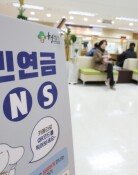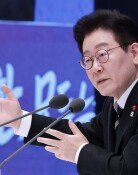Many Holes in Selecting Basic Welfare Benefit Recipients
Many Holes in Selecting Basic Welfare Benefit Recipients
Posted August. 06, 2003 21:34,
With the recent series of suicides reported, people are increasingly criticizing the Basic Social Welfare System set up to protect lowest income groups, claiming that it is not working properly. Academic experts and civil groups are raising their voices to demand improvement of the system.
A government-run research institute also estimated that some 1.4 million people are not under social welfare protection even though their incomes are less than the minimum level. This is because of the stringency of the system, and it seems inevitable that some changes should be made.
Academic experts are estimating that some 1.8 million people can be categorized as potentially needy and a further 3.2 million people as first-level needy. Currently, only 1.3 million people are under the protection of the system.
Conditions attached = The system allows only those who do not have anyone to depend on to benefit from the system. Anyone in the family, including distant relatives, is considered obligated to help out. However, experts argue that such far-related family members, such as grand parents and grand children as well as sisters and brothers, should be excluded from the responsibility of the program.
Kim Mi-gon, director of the Social Welfare Research Institute`s Basic Welfare System Evaluation Center, said, We should take into account the fact that the dissolution of a conventional family system is being accelerated while a nuclear family is now commonplace.
Civil groups such as Public Health & Welfare Democratic People`s Solidarity and the Korean Confederation of Trade Unions are demanding that directly-related sister-in-laws and sons-in-laws should also be excluded from the category of potentially obligated to help out. Yoo Jung-soon, a director at the Poverty Problem Research Center, said, In the long-term, we should get rid of the obligation-imposing system.
It is especially unreasonable to collect a certain rate of maintenance fee from a married daughter despite her low income, and revisions should be made so that a woman like this can pay the fee only in fixed amounts or in a smaller percentage.
Income Conversion Rate should be revised = Since the beginning of the year, the Ministry of Health and Welfare has been deciding who should fall under the Basic Welfare System by applying an income tax where all of one`s assets are converted into income. The conversion rate for regular assets, such as a house and land, stands at 4.17 percent per month, while for financial assets it`s 6.26 percent, and for personal vehicles 100 percent.
Originally, the Ministry expected that the number of recipients would increase by 20,000 with the conversion system. However, the number actually dropped by 40,000 compared to the previous year.
Experts point out that the conversion rate for regular assets tends to go over 50 percent, which makes those house-sellers live on the money. Professor Lee Tae-soo at Hyundo Social Welfare College has said, It should be taken into consideration that low income groups` houses and land have the lowest cash value.
According to the current system, if a low-income family owns an automobile worth 700,000 won that should be soon disposed of, its annual income goes over 8.4 million won.
Besides, the family would not receive grants only with the automobile since its asset value outnumbers a minimum monthly income level of 590,000 won. Civil groups have claimed, Personal vehicles are a necessity now, so policy-makers should change their thoughts towards automobiles lowering their conversion rate to that of regular assets.
Jin Lee leej@donga.com



![[속보]박근혜 손잡고 울먹인 장동혁 “더 큰 싸움 위해 단식 중단”](https://dimg.donga.com/c/138/175/90/1/wps/NEWS/IMAGE/2026/01/22/133209040.3.jpg)



